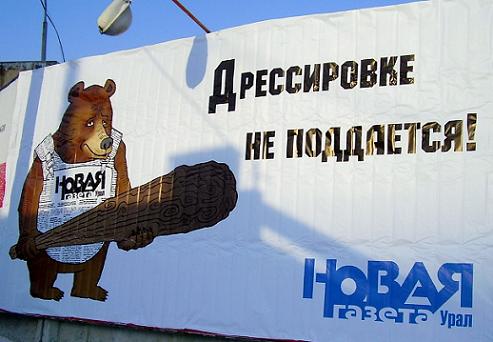«Средь бела дня» – ‘In Broad Day Light’ Posted by josefina on Jan 20, 2009 in News
«Дрессировке не поддаётся!» [Doesn’t succumb to taming (or training; teaching)] – I saw this splendid advertisement for «Новая газета» [‘New Paper’] in Yekaterinburg in early January, and had planned on using it for a post on the dative case with the words ‘Anna Politovskaya Would’ve Been Proud”, but yesterday’s events caused me to think it fits right now.
There are two ways you can live as a foreigner in Russia: either you can see your life there in the big ‘Russian Federation Perspective’ and get mad about everything that’s wrong and unjust and horrible, awful, terrible – or you can view your life as just being your life in this breathtaking, huge country inhabited by astonishing, kind, intelligent, generous and unique (in many, many ways! Both good and bad, I’m afraid) people. I try to live my life according to the second way, even though I know all is not as well as we wished it to be here, and that many things have changed since I arrived (for the worse), but my reality here is not as gruesome as what one might see on TV. Often I try not to take things that I read too «близко к сердцу» [‘close to heart’], but it’s not always possible. My Russia is the best country in the world – but I am aware that my Russia is not everybody’s Russian Federation. Early this morning, while I was browsing through «Русский репортёр» as I always do, I came across a title of a story that read «Средь бела дня» [adv. in broad daylight, in open daylight]. I noticed it first because I know it’s a phraseology that’s always puzzled me (it should be «среди белого дня» [‘in the middle of a white day’] for it to be a grammatically correct sentence, now shouldn’t it?), but as I read it I was no longer puzzled at all over any grammatical constructions whatsoever. The story shocked me, and I can’t even explain why I was so shocked this time, when it’s not the first time. I was really shocked when Anna Politovskaya was murdered in October 2006 (I’ve read all of her books; for Christmas 2005 my mother got me a Swedish translation of her “Putin’s Russia”), which was one of those ‘coming-of-age’ moments for me. But this – a lawyer pushing for the re-opening of a case that should’ve given the guilty prison for life is walking down the street after a press conference with a young female journalist (she was still just a student!) in the middle of the day in Moscow and are gunned down. And nobody sees anything! Markelov died immediately; the girl earlier this morning in the hospital after an operation that failed to saver her life. You can read about it in English at the Russophobe (usually that’s a bit hardcore for such a humanitarian as me, but in cases like these she’s the best!), or in Russian at Novaya gazeta’s own page (beware of nasty pictures; not for the sensitive).

Build vocabulary, practice pronunciation, and more with Transparent Language Online. Available anytime, anywhere, on any device.





Comments:
Don Schafer:
Again, many thanks for your blog, always enjoyable, educational, and today, emotional and so discouraging. Although I’ve never been there, I am fascinated with Russia and Russians, but I also feel conflicted about stories (and there are far too many) such as this one. God help us all. And it frustrates me that the West appears to ignore this lawless thuggery and continues to act as if Russia is an equal partner in fighting terrorism and is member of the civilized states generally. Wow.
Again, your blog is great, is appreciated, and is always a real pleasure. Keep it up.
Dmitry:
Эмм.. а можно у вас брать новости с RSS? Ссылку на вас поставлю.
Марк:
Может быть, мой коммент уже опоздал, но я все-таки напишу.
В древнерусском языке краткие прилагательные могли употребляться как определения и склонялись как существительные (полные прилагательные могли употребляться только в качестве определения). Отсюда остались выражения типа “на босу ногу”, “средь бела дня”, “красну девицу” и др.
Потом полные прилагательные вытеснили краткие в качестве определений, и сейчас вытесняют их в качестве сказуемых. Кстати, сами полные прилагательные возникли от слияния кратких с указательными местоимениями, поэтому и склоняются они как местоимения третьего лица, и значили определенность существительного, то есть работали как определенный артикль.